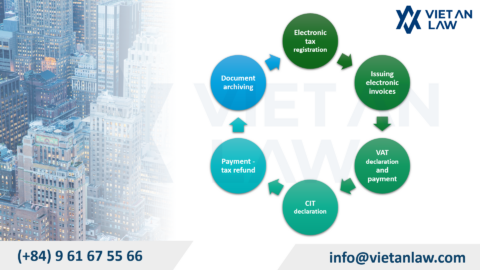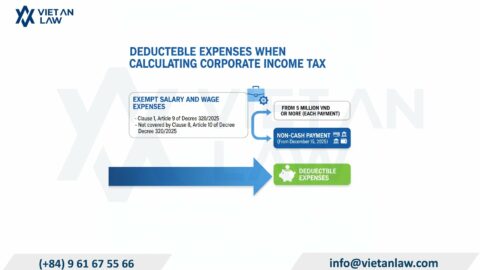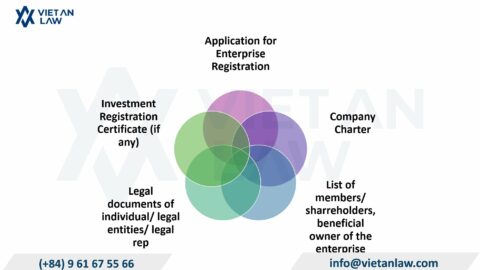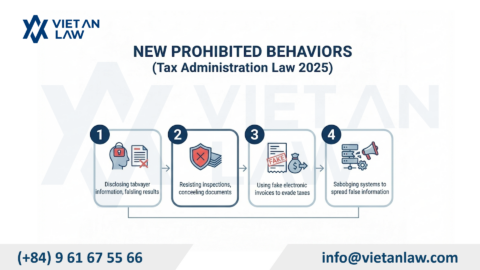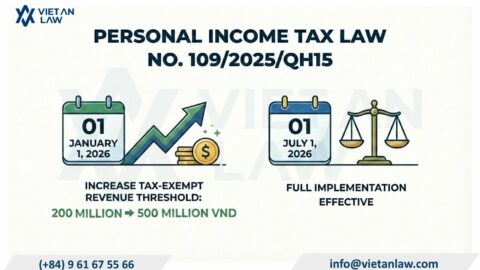A Value-Added Tax (VAT) invoice is a type of document used in the sale and purchase of goods and services. It is issued by the seller and records the detailed value of goods or services, as well as the VAT that the buyer must pay. Businesses use this invoice to declare output VAT (for the seller) and to deduct input VAT (for the buyer) as part of the tax declaration and financial accounting process following the law. Therefore, not understanding the regime on Value Added Tax (VAT) Invoice in Vietnam may result in administrative fines or even legal penalties for businesses. In this article, Luat Viet An will provide advice on the most important issues that businesses should pay attention to to comply with current VAT invoice regulations.
Table of contents
According to Decree 123/2020/ND-CP, which governs invoices and documents effective from July 1, 2022, all businesses must use electronic VAT invoices for VAT deduction.
Thus, when selling goods or providing services, the seller must issue an invoice to the buyer (including cases where goods or services are used for promotion, advertising, samples, gifts, exchanges, employee compensation, or internal consumption; goods provided under lending, borrowing, or return conditions) and must fully record all required details.
According to Clause 2.4, Article 6 of Circular 78/2014/TT-BTC (amended by Circular 96/2015/TT-BTC), certain business purchases of goods or services do not require an invoice, provided the seller prepares a “List of Purchased Goods and Services” in the format of form 01/TNDN attached to Circular 78/2014/TT-BTC. This list, along with payment documents, is required to qualify for tax deductions. These cases include:
When issuing invoices, businesses must apply the correct tax rate according to the Ministry of Finance’s regulations for the specific goods or services. Special attention should be given to the wording used on invoices, as errors could result in incorrect tax rates. For example, a transport business may be eligible for a VAT reduction on transportation services (from 10% to 5%). However, if the invoice mistakenly lists “vehicle rental” instead of “transport services,” the business may be subject to a higher tax rate of 10%.
To ensure that an invoice qualifies for VAT deduction and meets the requirements of current tax laws, businesses need to pay particular attention to VAT input invoices.
According to Article 6.1 of Circular 78/2014/TT-BTC, any purchase of goods or services with a value of VND 20 million or more (including VAT) must be paid via non-cash methods (e.g., bank transfer) to qualify for VAT deductions.
A mandatory condition for input invoices with a value of VND 20 million or more is that payment must be made through a bank transfer to qualify for VAT deduction. Therefore, businesses should pay attention to the following important points in the case of transactions involving invoices over VND 20 million:
If an invoice is paid in installments, all payments must be made via bank transfer, including the initial deposit. If a deposit is paid in cash and deducted from the invoice amount, the supplier must refund the deposit and make the payment via bank transfer for VAT deduction eligibility.
If multiple invoices are issued for purchases from the same supplier on the same day, each invoice must be under VND 20 million. If the total value of the purchases exceeds VND 20 million, the VAT deduction is not allowed.
Payments must be made from:
The buyer’s bank account ⇒ the seller’s bank account
If the payment is made from an account not registered under the buyer’s name, or if the payment is made to an account not belonging to the seller, VAT deduction is not permitted.
If a contract specifies a payment deadline but payment is not made by that date, the VAT deduction will not be allowed.
For fixed assets such as vehicles, the VAT deduction is subject to certain conditions. For example, vehicles with fewer than 9 seats (excluding those used for business purposes like transport, tourism, or hospitality) valued over VND 1.6 billion are not eligible for VAT deduction on the portion above that threshold. However, if the business is in the transport sector, the VAT can still be deducted.
If an invoice is declared in the current year but accounted for in the next year, the VAT value from that invoice will not be deductible.
If a business loses an input VAT invoice, it should request an electronic copy from the supplier or verify the invoice information using the provided database.
Businesses can check the validity of issued invoices at the official website: https://hoadondientu.gdt.gov.vn/
Under all circumstances, businesses are prohibited from purchasing or selling invoices. Violations may result in administrative penalties or criminal liability, depending on the severity of the violation.
By understanding the regime on Value Added Tax (VAT) invoice in Vietnam, businesses can significantly improve their accounting and financial operations. Viet An Law is always available to provide consultations and answer any questions from businesses.
Updated: 10/2024
